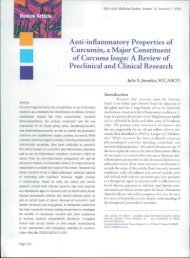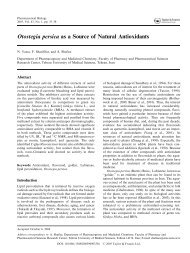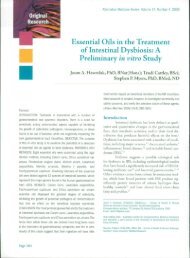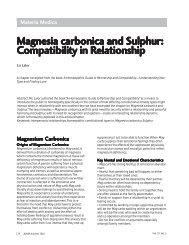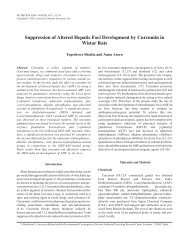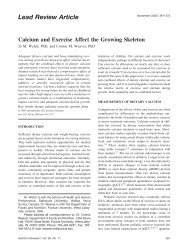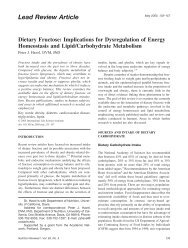Why Aging People Become DEPRESSED, FATIGUED, and ...
Why Aging People Become DEPRESSED, FATIGUED, and ...
Why Aging People Become DEPRESSED, FATIGUED, and ...
- No tags were found...
Create successful ePaper yourself
Turn your PDF publications into a flip-book with our unique Google optimized e-Paper software.
WHY AGING PEOPLE BECOME <strong>DEPRESSED</strong>, <strong>FATIGUED</strong>, AND OVERWEIGHT<br />
When these obese patients were given 1,000 mg,<br />
2,000 mg, or 3,000 mg doses of L-ti7ptophan one<br />
hour before meals to raise tbe amount of tryptophan<br />
relative to the large neutral amino acids, a significant<br />
deerease in calorie consumption was obsei^ved. The<br />
majority of the reduction in ealoric intake was due<br />
to the amount of carbohydrates, not protein, consumed.<br />
The only side effects observed were a mild<br />
decrease in mental alertness, mild dizziness, <strong>and</strong><br />
mild drowsiness.^''<br />
In a double-blind, placebo-controlled study,<br />
obese patients on protein-rich diets who received<br />
tryptophan (750 mg twice daily orally) had significant<br />
weight loss, compared with a placebo group. A<br />
moderate dose of ti^ptophan supplementation did<br />
not cause any side effects such as mid-day sleepiness<br />
or fatigue." The effects of reducing tryptophan levels<br />
were also studied in a 7-year-old girl with severe<br />
anorexia. When tryptophan levels were reduced,<br />
spontaneous eating occurred for the first time in<br />
4.5 years. The spontaneous eating ceased when the<br />
tryptophan intake was increased.^''<br />
How <strong>Aging</strong> Reduces<br />
Tryptophan-Serotonin Levels<br />
As a result of normal aging, inflammatory cytokine<br />
levels increase. A little-known adverse effect is that<br />
inflammatory cytokines (such as tumor necrosis<br />
factor alpha <strong>and</strong> interferon alpha) cause induction<br />
of the tryptophan-degrading enzyme IDO<br />
{indoleamine 2,3-dioxygenase).<br />
You might think that aging people could compensate<br />
for the tryptophan-degrading effects of IDO by<br />
consuming higher doses of tiyptophan supplements.<br />
The problem is that in the presence of high blood<br />
levels of tr>'ptophan, the other tryptophan-degrading<br />
enzyme TDO is also elevated.<br />
So consuming large amounts of L-tryptophan (oral<br />
doses of 4,000 mg <strong>and</strong> greater) will not generate more<br />
serotonin because TDO will be induced. Yet if aging<br />
people fail to get more tryptophan into their bodies,<br />
brain serotonin levels will plummet because the higher<br />
IDO enzyme activity will degrade what little tiyptophan<br />
remains in the blood.<br />
Engineering Around This Problem<br />
Fortunately, the new underst<strong>and</strong>ing of how tryptophan<br />
is degraded in aging humans provides a basis for<br />
engineering a natural solution around this epidemic<br />
problem.<br />
First of all, we know from studies in patients with<br />
high levels of systemic inflammation that if sufficient<br />
niacinamide is given, the degradation of tryptophan<br />
in the body is significantly reduced."'^" We also know<br />
that the amino acid lysine competes with tiyptophan<br />
in the same oxidative degradation pathway. This<br />
means that in the presence of lysine, less tryptophan<br />
is oxidized.^^<br />
Tryptophan, however, can still be degraded by the<br />
IDO enzyme that increases as humans age. Nutrients<br />
such as curciimin inhibit interferon-induced nuclear<br />
factor-kappa-B <strong>and</strong> COX-2 expression <strong>and</strong> may limit<br />
the induction of IDO, thus making more tryptophan<br />
available for conversion to serotonin in the brain.'^'<br />
UFE EXTENSION I COLLECTOR'S EDITION 2009





